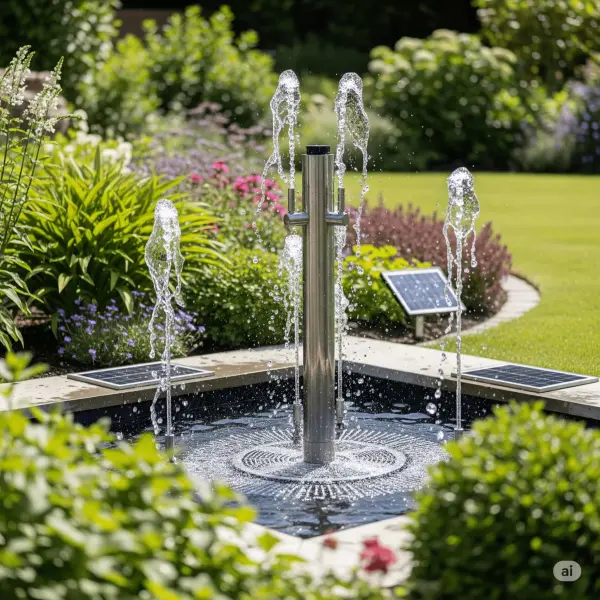Solar Energy Water Fountains: The Eco-Friendly Choice for a Beautiful Outdoor Oasis
 1. Introduction
1. Introduction
Imagine stepping into your backyard and being greeted by the gentle sound of trickling water, all powered by the sun. There’s something incredibly peaceful about a water fountain — it brings movement, life, and ambiance to any outdoor space. But what if that beauty could also come with a lighter environmental footprint and zero energy costs?
Enter solar energy water fountains — the perfect blend of elegance, eco-friendliness, and practicality.
In this guide, we’ll explore everything you need to know about solar-powered fountains: what they are, how they work, their benefits, and how you can choose the best one for your garden, patio, or even balcony.
Whether you're an eco-conscious homeowner, a garden enthusiast, or just someone looking for a relaxing upgrade to your outdoor space — this article is for you.
2. What Are Solar Energy Water Fountains?
Solar energy water fountains are outdoor water features powered entirely by the sun. Instead of relying on traditional electricity, these fountains use solar panels to capture sunlight and convert it into power for the pump, which circulates the water.
They come in a wide range of designs — from sleek modern bowls and tiered classical sculptures to whimsical birdbaths and minimalist rock features. What sets them apart isn’t just aesthetics, but the clean energy source that makes them run.
You’ll often find solar fountains in:
-
Gardens
-
Courtyards
-
Patios
-
Balconies
-
Wildlife habitats
-
Meditation areas
They're often used as centerpieces or accent features and can significantly boost the curb appeal of your property — all without adding to your energy bill.
3. How Do Solar-Powered Fountains Work?
At the heart of a solar water fountain is a small, efficient solar panel — either embedded within the fountain or attached via a cable.
Here’s a step-by-step breakdown of how they work:
-
Sunlight hits the solar panel, typically made of photovoltaic (PV) cells.
-
These cells convert solar energy into electrical energy, which powers a small water pump.
-
The pump draws water from the fountain’s basin and circulates it to create a flowing or bubbling effect.
There are two main types of solar fountains:
-
Direct solar-powered: These only operate in sunlight, perfect for warm climates or daytime-only operation.
-
Solar-powered with battery backup: These store energy during the day and continue to work after sunset or on cloudy days.
Some advanced models also come with features like:
-
LED lighting (for nighttime ambiance)
-
Adjustable water flow
-
Remote control settings
-
Separate solar panels with long cords for flexible placement
4. Benefits of Solar Water Fountains
Solar energy water fountains offer more than just visual appeal. They bring a whole range of benefits that make them a smart investment for any outdoor space.
🌍 1. Eco-Friendly and Sustainable
One of the biggest advantages of solar fountains is that they reduce your carbon footprint. They operate entirely on solar power, meaning no fossil fuels, no emissions, and no drain on the grid. If you’re passionate about green living or reducing your household’s environmental impact, this is a no-brainer.
💰 2. Cost-Effective
Once you buy the unit, it costs nothing to operate. No electricity bills, no wiring, no electrician fees. Over time, this adds up to significant savings — especially when compared to plug-in water features that can raise your utility costs.
🔌 3. No Wiring Required
Installing a traditional electric fountain usually involves burying wires, checking voltage compatibility, or hiring a professional. Solar fountains are often plug-and-play — just place them in the sun, add water, and they’re good to go.
🧘 4. Creates a Soothing Atmosphere
The sound of flowing water has been shown to reduce stress, improve mood, and even boost creativity. A solar fountain can transform a noisy urban patio into a peaceful sanctuary or make a dull yard feel like a lush oasis.
🐦 5. Attracts Wildlife
Birds love fountains. They’ll come for a drink or a quick bath, making your garden feel more alive. And because there’s no electric current near the water, solar fountains are safe for animals, including pets and pollinators.
🔧 6. Low Maintenance
Most models are built with weather-resistant materials and have very few moving parts. Without complicated electronics or wiring, there’s less to break down over time.
5. Common Types and Designs
When shopping for a solar energy water fountain, you’ll notice a wide variety of styles. Choosing the right one depends on your aesthetic, space, and intended use.
Here are the most popular types:
🪷 A. Tiered Fountains
Often styled after classical European designs, these fountains have multiple levels, allowing water to cascade from top to bottom. They create a soothing, waterfall-like sound and make a grand statement.
Best for: Front yards, formal gardens, courtyards.
🐦 B. Birdbath Fountains
Combining a birdbath with a solar-powered bubbler, these are ideal for attracting birds. They’re shallow, and decorative, and encourage regular visits from feathered friends.
Best for: Backyard gardens, decks, wildlife habitats.
🌾 C. Floating Solar Fountains
These lightweight pumps float on water and spray water upward in a fountain pattern. Easy to use, they’re best suited for small ponds or decorative basins.
Best for: Ponds, temporary setups, DIYers.
⛲ D. Wall-Mounted Solar Fountains
Perfect for patios or small balconies, these vertical fountains are hung like artwork and recirculate water using built-in pumps and solar panels.
Best for: Urban patios, balconies, narrow gardens.
🪨 E. Rock and Bowl Fountains
Made to look like natural stone, these fountains blend seamlessly into rustic or woodland-style gardens. Their subtle trickle mimics natural streams.
Best for: Zen gardens, naturalistic landscaping.
6. Where to Place Your Solar Fountain for Best Results
Placement is key when it comes to getting the most out of your solar-powered fountain. Here are some tips to ensure optimal performance and aesthetic appeal:
☀️ 1. Maximize Sun Exposure
Your solar panel needs direct sunlight — ideally 6–8 hours a day. Avoid placing the fountain under trees, eaves, or in shady corners. If your model has a separate solar panel with a cord, you can place the panel in the sun while positioning the fountain in a shaded area.
🌬️ 2. Shelter from Strong Winds
High winds can scatter the water spray and dry out your fountain faster. Try placing it in a slightly sheltered area, like next to a wall, fence, or hedge.
🎯 3. Level Ground is a Must
A tilted base can lead to water spilling over or uneven flow. Always set the fountain on a level surface like stone pavers, a wooden deck, or compacted soil.
🧩 4. Easy Access for Refilling and Cleaning
Place the fountain where you can easily top off water levels (especially in hot weather) and clean debris like leaves or bird droppings. Avoid placing it directly under trees if possible.
🌿 5. Blending with Landscape Design
Use plants, stones, or garden art to help the fountain feel integrated into your space. Think of it not just as a product but as a focal point in your garden’s overall design.
7. Maintenance Tips and Longevity
Solar water fountains are known for being low-maintenance, but a little care goes a long way in keeping them running smoothly and looking great.
Here’s how to keep your solar fountain in top shape:
💦 1. Keep the Water Clean
Dirty water can clog your pump. Use distilled water if possible, or refresh the water every few days to avoid the buildup of algae, debris, or mosquito larvae.
Pro Tip: Add a drop of natural fountain cleaner or a small piece of copper to discourage algae growth.
🧼 2. Clean the Pump Monthly
The pump is the heart of your fountain. Remove it and gently clean it using an old toothbrush and mild soap. Pay special attention to the intake and impeller.
Signs your pump needs cleaning:
-
Water flow becomes weak or stops
-
Strange noises or vibrations
-
Visible debris in the intake
☀️ 3. Check the Solar Panel Regularly
Dust, leaves, and even bird droppings can reduce solar efficiency. Wipe down the panel with a damp cloth every couple of weeks. Avoid harsh chemicals that may scratch or damage the surface.
❄️ 4. Winterize if Needed
If you live in a region with freezing temperatures, always drain the fountain and store the pump indoors during winter. Ice can crack the basin or damage internal parts.
🧰 5. Replace Worn Parts
Even the best solar fountains may need a replacement pump or panel after a few years. Thankfully, most are modular and you can swap parts easily without replacing the entire unit.
8. Solar Fountain vs. Electric: A Detailed Comparison
Wondering whether to go solar or stick with a traditional electric fountain? Here’s a side-by-side breakdown to help you decide:
Feature Solar Fountain Electric Fountain Power Source Sunlight Electricity (grid power) Operating Cost Free (once purchased) Ongoing electricity cost Installation Easy, no wiring May require an electrician or permits Environmental Impact Eco-friendly, renewable energy Higher carbon footprint Run Time Daytime (or battery at night) 24/7 with a stable power source Flexibility Portable, placed anywhere with sun Limited by power outlet availability Maintenance Lower, fewer parts Higher due to electrical components Initial Cost Lower to mid-range Often higher due to wiring & setup Reliability Sun-dependent may slow on cloudy days Consistent performance 10. Top Features to Look For When Buying
Not all solar water fountains are created equal. Whether you’re buying online or at your local garden center, here are the most important features to consider before making your purchase:
🔋 A. Battery Backup
A built-in rechargeable battery allows the fountain to run during cloudy weather or in the evening. If you want consistent performance, especially after sunset, look for models with a lithium or NiMH battery.
🔆 B. Separate Solar Panel
Some fountains have the solar panel built in, while others use a separate panel connected by a wire (usually 8–16 feet long). Separate panels give you flexibility in placement, letting you put the fountain in a shaded area and the panel in full sun.
💦 C. Water Flow Options
Look for adjustable flow settings or different fountain heads. This allows you to control the height and style of the water spray — from bubbling to jet streams — depending on the ambiance you want.
🧽 D. Easy Maintenance Design
Choose a model with accessible pump housing and removable parts for easy cleaning. A clogged pump is the number one cause of poor performance.
🌜 E. LED Lights
Some models include solar-powered LED lighting that automatically turns on at dusk. Perfect for nighttime ambiance on your patio or in your garden.
📐 F. Size and Capacity
Measure the space where you plan to put the fountain and choose a size that fits without overcrowding. Larger fountains create more sound and visual impact but may require more water and cleaning.
🌧️ G. Weather Resistance
Look for UV-resistant, rust-proof, and frost-tolerant materials like polyresin, fiberglass, or high-quality ceramics — especially if you live in areas with extreme weather.
11. Real-Life User Reviews & Testimonials
Let’s take a look at what real users are saying about solar energy water fountains. These testimonials reflect common feedback seen on major retail platforms like Amazon, Home Depot, and Wayfair.
“I placed this in the middle of my garden and it changed the whole vibe. Birds come daily, and the gentle sound makes my morning coffee feel like a spa retreat.”– Sandra M., Oregon
“The floating solar fountain was a fun addition to my pond. Easy to set up, works great when it’s sunny. It even surprised the neighborhood kids — they love it!”– Derrick J., Florida
“I wanted a fountain on my shady balcony but couldn’t run electric. The separate solar panel option was a game changer — now I have peaceful bubbling water without any hassle.”– Linh T., California
“Battery backup makes a big difference. Mine runs well into the evening, and I’ve had it for two summers with no issues at all. Just remember to clean the pump!”– Angela R., New York
These reviews reinforce a few key points:
-
Users love the stress-free setup
-
The visual and sound effect is consistently praised
-
Proper placement and cleaning are essential for best results
12. How to Make a DIY Solar Water Fountain
Feeling crafty? You can create your solar fountain at home with just a few materials. This is a fun, budget-friendly weekend project — and it allows you to fully customize your design.
🛠️ What You’ll Need:
-
A solar fountain pump kit (available online or in garden centers)
-
A container or basin (ceramic pot, galvanized tub, stone bowl, etc.)
-
Decorative rocks, plants, or ornaments (optional)
-
Clean water
-
Access to direct sunlight
🧩 Step-by-Step Instructions:
-
Choose Your Container
-
Select a waterproof container that fits your aesthetic. It can be a flower pot, birdbath, or even a vintage sink.
-
-
Place the Pump
-
Position the solar pump at the bottom. Most kits come with suction cups to keep them stable. If it floats, weigh it down with small stones.
-
-
Add Water
-
Fill the container until the pump is submerged. Make sure the water level stays above the pump while it’s operating.
-
-
Install the Solar Panel
-
Place the panel in a sunny area. If it’s attached with a cord, route the cable discreetly around the edge of your setup.
-
-
Customize with Decor
-
Add decorative stones, shells, plants, or floating flowers for an artistic touch. These won’t affect performance but will enhance the look.
-
-
Test and Adjust
-
Once the sun hits the panel, the fountain should begin to spray. Adjust the height or swap fountain heads for the desired effect.
-
💡 Pro Tip:
If you want the fountain to run at night, choose a pump kit with a battery backup and built-in LED lighting.
DIY solar fountains are ideal for small patios, table centerpieces, or even as a gift idea. They’re surprisingly simple — and incredibly satisfying to build.
13. Where to Buy the Best Solar Energy Water Fountains
Thanks to their growing popularity, solar fountains are widely available — but quality varies. Here are the best places to shop for reliable models with good warranties, customer reviews, and replacement part availability.
🛒 1. Amazon
Amazon offers a wide range of options, from small floating fountains to large, multi-tiered installations. Read customer reviews, check the Q&A sections, and look for listings with high ratings (4 stars and above).
Tip: Choose “Amazon’s Choice” or “Top Seller” tags when in doubt.
🧱 2. Home Depot & Lowe’s
These big-box stores offer in-store and online selections. Their in-house garden brands often have seasonal discounts, and you can check them out physically before buying.
Tip: Look for solar fountains with a minimum 1-year warranty, especially for outdoor electrical components.
🌱 3. Wayfair & Overstock
Ideal for decorative or designer-style solar fountains. If you're looking for something more stylish than functional, these platforms offer ornate and contemporary designs you won’t easily find elsewhere.
🪴 4. Specialty Garden Stores
Local garden centers often carry solar fountains curated for your climate and garden needs. You might pay a little more, but you get local advice, personalized support, and usually better aftercare service.
🌐 5. Niche Eco-Retailers
Sites like Gardener’s Supply Company or Solar-Fountain.com specialize in green garden gear. They often stock battery-backed models, extra parts, and more premium-grade materials.
14. Frequently Asked Questions (FAQs)
To help you make a confident decision, here are answers to some of the most commonly asked questions about solar-powered water fountains.
❓ Do solar fountains work on cloudy days?
Yes — but only if they have a battery backup. Otherwise, performance will be limited or stop altogether on overcast days.
❓ Can I leave my solar fountain running all the time?
Absolutely — as long as the water level is maintained and the pump is clean. Many solar fountains turn off automatically when the sun sets or the battery is drained.
❓ Is the water safe for pets or birds?
Yes. As long as you don’t use any chemical additives, the water is safe for animals to drink or bathe in. In fact, many solar fountains double as birdbaths.
❓ How often should I clean the fountain?
Every 2–4 weeks, depending on your location and water quality. If you notice reduced flow, strange noises, or visible debris, clean it sooner.
❓ Can I convert my existing fountain to solar?
Yes. You can buy standalone solar pump kits and retrofit them into your existing water feature, as long as it has a suitable container and water depth.
15. Conclusion: Why Solar Water Fountains Are Worth It
If you want a beautiful, eco-conscious, and low-maintenance addition to your garden, solar energy water fountains are one of the smartest investments you can make. Whether you’re attracting birds, creating a meditative oasis, or simply trying to enhance your curb appeal, a solar fountain delivers style and sustainability.
With no wiring, no electric bills, and very little upkeep, it’s easy to see why solar fountains have become a favorite among homeowners, gardeners, and even apartment dwellers.
✅ Final Takeaways:
-
They’re powered by sunlight — clean, renewable, and free.
-
Easy to install with no wiring or electrician needed.
-
Low operating cost and long-term savings.
-
Excellent for wildlife, relaxation, and ambiance.
-
Available in all styles, sizes, and budgets — from DIY kits to designer models.
Ready to transform your outdoor space?
🌞 Browse the best solar energy water fountains on Amazon, Wayfair, or your local garden center today. Look for battery backups, separate solar panels, and UV-resistant designs for the best experience.
And if you're feeling creative, why not try building your DIY solar fountain? It's fun, budget-friendly, and a fantastic way to personalize your outdoor decor.
-







Comments